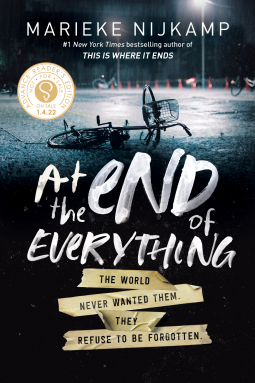The teenagers at Hope Juvenile Treatment Center feel like the world has abandoned them. After committing crimes that may or may not have been dangerous, dozens were sent to Hope at the edge of the Ozarks in Arkansas, to change their behavior. There is a psychologist there to help them, but the guards and the warden just want to keep order. And the school is a joke, with a handful of battered textbooks.
Emerson is new to Hope. They are still learning the rules, both the written ones and the unwritten ones. When Grace stands up for them to the guards, for misgendering Emerson, Grace gets sent to the warden’s office. But when she’s there, the warden doesn’t give her the usual speech. It’s a shortened version, as he’s tossing files into his briefcase. The warden tells her that she is responsible for the choices that got her here. Then he sent her back to her cell.
Later that night, Emerson and Grace cross paths again. Emerson is on her way to meet with Hunter, the de facto leader among the teenagers, for her unofficial introduction to Hope. Grace has snuck out to see what’s going on. That meeting earlier with the warden didn’t sit right with her, like something was wrong, and she wanted to know what it was. She walks around waiting for the guards to catch her out. But none of them show. She gets to the guard room and sees that not only are there no guards, all the screens are dark. No one is watching them.
The next day, the teens try to figure out what is going on. They find out that there is a plague that has taken over the world, and the parent company of Hope has sent all the adults away. They are there alone. It is up to the teens to survive. But they can’t agree on what to do. Some want to leave Hope, and others feel it’s safer to stay. Hunter decides to lead a group up the road to the closest small town, but as they get close to the town, they come up against a roadblock with soldiers who are holding guns.
They end up turning back and going back to Hope, but not without consequences. One of the boys gets shot, and not long after they get back to Hope, one of the twin sisters starts coughing up blood. The plague made its way back with them.
With no adults around to help them, and no one able to get to them, Grace takes over the leadership at Hope. They set up an infirmary and start an inventory of what’s in the kitchen. As they divide up the tasks to do what they need to, more of the teens get sick, and many of them decide to leave. Hunter wants to go back up the road and find away around the National Guard to get to the town. But many stay behind and try to figure out what they can do.
Isaiah takes over the computers, trying to find as much information as he can to help them. Many of them call family or friends, to see how they’re doing out in the world. A couple take over in the kitchen, and some start a garden. Casey stays in the infirmary to take care of the sick, and when they lose their first friend to the plague, Emerson takes it on themself to dig the grave.
As the days slip by, the teens are faced with more challenges. They figure out how to hunt and fish, how to ration their food and medicine, how to distance from each other but stay connected, and they also spend a lot of time thinking about the circumstances that brought them to Hope in the first place. Emerson has to dig more graves. Casey has to care for more patients. Grace has to make difficult choices. And they all have to come to terms with the fact that all the adults let them down, they left them there to die.
Instead, those who can, choose to survive.
At the End of Everything is not an easy book to read. As we are all sill facing a pandemic (though not nearly as bad as the plague in this book), there is still a lot of fear and uncertainty in the world. This book did not help me feel better about that. But it’s honest about the struggle to survive, and it’s fascinating to watch these characters, the way you watch the characters in a horror film or on The Walking Dead. You have to be okay with the knowledge that you could lose your favorite character at any moment.
Author Marieke Nijkamp has a way of writing stories that tear you apart, At the End of Everything certainly fits that description. I had tears in my eyes several times, feeling for these characters and this horrifying situation they found themselves in. It’s heartbreaking to see how all the adults around them let them down, from the families that didn’t help them when they were first in trouble to the warden and guards, the soldiers and townspeople who refused to help them after the plague started. But the way these teens decide to continue on, to have hope (no pun intended) for a future, to stick together is inspiring. There is a lot of pain in this book, but there is grace also (again, no pun intended). But know that this story will stick with you for a long time, and some of that time may be in your nightmares.
Egalleys for At the End of Everything were provided by Sourcebooks Fire through NetGalley, with many thanks.

